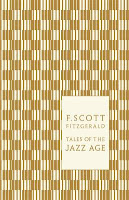This collection of eight short stories is compiled from Fitzgerald's two anthologies, Flappers and Philosophers (1921) and Tales of the Jazz Age (1922). Why the original collections were not preserved (the current mismatching is very confusing) is beyond my comprehension, but then, I cannot pretend to understand most of Penguin's publishing decisions. Having already read five of the tales in a previous edition, I was left with 'Head and Shoulders', 'The Four Fists', and 'O Russet Witch!' The other stories included one of my personal favourites, 'The Cut Glass Bowl', which is definitely worth a read. As mentioned in a previous review, Fitzgerald, in my opinion, shines best in his shorter compositions. They offer slices of riotous, often surreal lives set in the disillusionary jazz age.
A common character of Fitzgerald's is a slim, usually anally-retentive and snobbish Princeton or Yale student who falls in love with a beautiful but fickle prima donna, obviously mirroring himself and his wife Zelda. Sometimes, after a period of effervescent courtship, the pair end up marrying, but mostly, the man is left pining after the lost American dream. Social climbing and the pursuit of wealth is a strong recurring theme, glaringly consistent with the booming period in which Fitzgerald was writing. The tales are relatively simple in terms of plot, yet written in a highly unique and stylised manner which remain immensely appealing to the modern reader. References to songs, events, and customs of the twenties will be invariably lost on a younger generation, but this in no way hampers one's enjoyment.
'The Four Fists' is a particularly humorous sample from the book, being the reminiscences of wealthy businessman, Samuel Meredith, who delegates his success to four punches to the face at various points in his life. After each assault, he is cured of a different vice; successively arrogance, snobbery, lust, and avarice, leading to his emotional development and possession of inner happiness. 'O Russet Witch', on a less positive note, relates the familiar tale of unacted upon desire. The message here is one of wasted opportunity, an elderly bookshop owner reflects on a series of four encounters with an alluring female seductress and his lamentation of having never taken a risk in life. It makes for a depressingly uncomfortable, albeit inspiring read. The collection falls a star for being somewhat limited, and containing the insufferable 'The Curious Case of Benjamin Button.'
Rating: 3/5

No comments:
Post a Comment